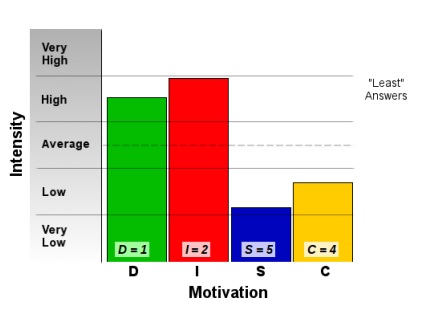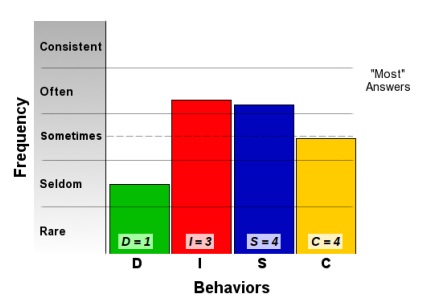Introduction
Reviewing the data will enable me to decide how my character can complement those of others. My communication and listening styles will change due to the assessment’s findings. My wish is supported by Carbonell’s (2008) statement about understanding personality patterns as one of the keys to strengthening your connections and resolving people’s problems. Therefore, the paper aims to learn how characteristic patterns influence interpersonal effectiveness.
Guiding Purpose Statement
Seeking to be an imitator of Christ, I am committed to becoming a fair supervisor. I chose this GPS because I am interested in developing my skills as an effective and attentive communicator. God knows the worst about us, yet he still loves us nonetheless, “so we no longer have to hide our secrets from him,” according to Nichols (2017, 13). Thus, I want to believe that God uses my intention of self-growth in my interpersonal context. Nobody is perfect, and my imitation is a good step to supervising others with fair purposes. Following Hopwood et al. (2019), I should investigate my personality more to connect meaningfully and adequately with various individuals. My task is to listen and observe people succeed in promotion and decision-making.
DISC Description
The results from my Professional/Leadership DISC Profile show that I can influence and inspire people. As shown in Figure 1, “This Is Expected of Me,” I have a high degree of leadership and the ability to succeed in dominance and inducement (Harris & Eikenberry, 2022). I possess good wisdom as I deal with money and projects rationally. The only time individuals appear to encounter resistance from me is when I engage in actions or complete tasks clearly outside the realm of logic or understanding. My hallmark is the emotional journey to deal with our emotions and feelings (Nichols, 2017). I focus on each personality and possess a greater standard of a people-based leadership style. Addressing Figure 2, “This Is Me,” I discovered the required qualities of inducement and steadiness but low abilities to dominate (Harris & Eikenberry 2022). Sometimes I lack boldness and aggression, and I dislike pointless conflict.


DISC Style Alignment
Active/Task-Oriented “D”
My style will be challenged by the “D” personality’s tendency toward assertiveness. I would be capable of handling a type D temperament since they prefer someone direct but still provides room for self-actualization (Carbonell, n.d.). I am not good at exerting pressure, but I am great at creating options. I must avoid letting strictness affect my mood if I work with them because I have prone to mood swings. I do not mind working in a disciplined environment, but I need an approachable and professional leader. Confidence in choice-making is my purpose and the major way to improve (Jantz, 2018). I will be ready to assert myself with a strong character when necessary.
Active/People-Oriented “I”
With interpersonal relationships, this personality works well. If I may be a leader with a type I character, I should keep in mind that I am also their friend. This temperament needs to be acknowledged and commended for employee work, so I will give them some space to flourish and know that their efforts and accomplishments will not go unnoticed or underappreciated. According to Petersen (2015), people try to push their emotions but cannot achieve the desired impact. Following the “I” personality qualities, I will try to focus on people’s stories and understand their needs. It should be simple to cope with this personality and achieve success.
Passive/People-Oriented “S”
I must remember that about the background to the limelight because of my innate desire to be in public view. I will keep in mind that when managing the S type and concentrate on maximizing abilities to work in settings to support individualism. If a type S is leading, I will follow instructions, but I need to voice my concerns or offer suggestions privately. If I should be a leader, I will need to learn to be precise and fluid in my instructions (Rice, 2018). This personality can help me become more structured and detailed, but it will require significant effort (Carson, 2019). If I am being guided by type C, I should remember to write notes and raise questions to comprehend the explicit guidance I will provide.
Passive/Task-Oriented “C”
I want to believe that the “C” personality is what I can successfully cope with as a supervisor. It was a truly eye-opening experience since some of the findings were not particularly shocking (Harris & Eikenberry, 2022). I may take away helpful advice and insights that will help me improve as a leader, listener, and communicator. Carbonell (2008) recommends developing interpersonal relationships to complete tasks and analyze the outcomes. My practice to improve the alignment with the C personality type should include seeking the truth, communicating, and the analysis of other people’s behaviors. My goal is not to change my skills but to strengthen the already obtained knowledge for this particular type to empower my leading role in communication. I recognize that I typically appreciate praise and rewards for a job well done while also enjoying working in an environment where I have the flexibility to be who I am.
Care-Seeker Connection
Josh, Bruce and Cindy’s oldest child, is a college student. He appears to be quite composed and deliberate (Rice, 2018). Even though it is clear he is in great pain, he likes to look for the good in everything. Josh fits the personality type “I” mold, in my opinion. His body language and voice tone alter when unpleasant things happen, which is obvious when he is having difficulty (Baumert et al., 2017). Josh would continue seeking a solution to make the scenario appear better, even though Bruce’s attitude was harmful to his younger brother Brody. He may fit the description given by Carbonell (2008) that “You can be higher than a kite or lower than a skunk” (119). The first Petersen (2015) technique is to recognize Josh’s thoughts and feelings completely. This type of acknowledgment is accepting what the talker believes or is attempting to say without arguing or passing judgment (p. 110). Josh wants a place where he can express himself freely rather than constantly trying to be collected and composed when upset.
The capacity to examine Josh’s statements to determine his true emotions will happen in this situation. I would also suggest Petersen’s (2015) third technique, para-feeling. Therefore, if he puts on his customary attitude, I can attempt to cut through his words to learn what he is truly feeling and thinking. This DISC style shift is hard to make, but certain steps cannot be ignored because they help me align with my care seeker’s DISC style. For example, if he had to reject the emotion I offered, I would devise a technique to skirt the subject by discussing recent changes, future focus, and managing options until the genuine emotion was clear (Kollar, 2011). The main error I want to steer clear of with Josh is asking for one-word responses. To prevent sending Josh back into a condition where he suppresses his emotions, I have to be able to give him room to elaborate and talk openly.
Mentor Connection
Following the findings from the mentor’s DISC outcomes and Interview data, I should begin to adjust my personality to meet their I/D type of character. My mentor thinks my inability to take the initiative when necessary is my worst flaw. Whenever it is time to make final decisions, I take a back seat. I am willing to give up my opinions to prevent controversy and avoid appearing overly domineering. My mentor also advised me to increase my confidence when making choices (Jantz, 2018). My mentor claims that when pushing my ideas forward, I feel very frightened of being rejected or challenged, which causes me to stutter and speak too slowly.
My mentor is an extremely strong and domineering personality, so it makes sense. My supervisor has no trouble taking the lead, putting their views forward, and engaging in a verbal battle to make their arguments. Matching these characteristics will be difficult, but fortunately, I have an “I” personality that can absorb suggestions and listen (Harris & Eikenberry, n.d.). At the same time, my “S” side needs to be able to adapt to the situation fast and recognize when it is appropriate to stand up and politely assert my authority.
Conclusion
Learning about myself has not been easy, especially concerning my current personal circumstances. I am appreciative of the newfound understanding. Addressing the “So What? of it All” perspective, I have enough space for improvement to demonstrate the best communication methods. I look forward to developing my weaker areas along with strengthening and retaining my strengths. God will keep bringing other traits into my life; no matter my personality, I must be ready to assist others. Letting additional information about my character and how it all functions in the ministry, professionally and personally, flow.
References
Baumert, Anna, Manfred Schmitt, Marco Perugini, Wendy Johnson, Gabriela Blum, Peter Borkenau, Giulio Costantini, Jaap J. A. Denissen, William Fleeson, Ben Grafton et al. 2017. “Integrating Personality Structure, Personality Process, and Personality Development.” European Journal of Personality 31, no. 5: 503-528.
Carson, Robert C. 2019. Interaction Concepts of Personality. London: Routledge.
Carbonell, Mels. n.d. “Uniquely You DISC Assessment.” Web.
Carbonell, Mels. 2008. How to Solve the People Puzzle: Understanding Personality Patterns. Blue Ridge: Uniquely You Resources.
Hopwood, Christopher J., Aaron L. Pincus, and Aidan G. Wright, 2019. “The Interpersonal Situation: Integrating Personality Assessment, Case Formulation, and Intervention.” Using Basic Personality Research to Inform Personality Pathology, 94-121.
Harris, Guy, and Kevin Eikenberry. 2022. “A Free DISC Personality Test: Gain Insights to Build Better, Stronger, More Fulfilling Relationships.” Web.
Jantz, E. L. 2018. Mentor’s 360° Interview Worksheet.
Kollar, Charles., A. 2011. Solution-Focused Pastoral Counseling: An Effective Short-Term Approach for Getting People Back on Track. Grand Rapids: Zondervan.
Nichols, Ken. 2017. Masterpiece: Seeing Yourself as God’s Work of Art Changes Everything. Lynchburg: Liberty University Press.
Petersen, Jim. 2015. Why Don’t We Listen Better? Communicating and Connecting in Relationships. 2nd ed. Portland: Petersen Publications.
Rice, Dwight. 2018. A Case Study on Crossroads: A Story of Forgiveness. Lynchburg: Liberty University.